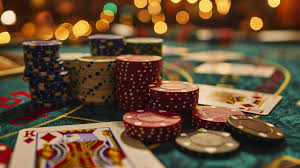Many people find casinos an entertaining way to pass an evening, yet behind their flashing lights and loud music lies a complex psychology designed to encourage you to spend more money.
FORC provides flexible experimental control of an online casino environment to study learning and extinction of gambling behavior as well as evaluate responsible gambling tools. Participants are recruited via lists of available tasks on AMT platform and given informed consent by selecting “be referred” when providing informed consent to attend FORC.
Routine
Rituals are formalised actions performed regularly within an environment to express, inculcate and reinforce core beliefs and values among its participants. Rituals also serve to form bonds within groups as members establish or strengthen identities through these activities.
Casino gaming enthralls players with a sense of achievement that comes from winning, yet designing game mechanics that do not become too addictive is crucial to ensure long-term fun for everyone involved. Responsible gaming features such as self-exclusion, deposit limits and playtime reminders should also be implemented into game designs in order to prevent addiction from gaming too addictively.
Studies show that higher event frequency games are more likely to lead to problem gambling behavior than low event frequency ones, due to a lack of opportunity for reflection between events – this may result in adaptive responses such as loss-sense behavior when punishment (in this instance) is applied – than lower event frequency ones.
Ritual
Superstitions help gamblers feel in control of a game that relies heavily on luck. Unfortunately, these rituals don’t guarantee victory; their outcomes are determined solely by random number generators.
Still, rituals provide a comforting sense of security in an otherwise chaotic world, helping players make smart decisions when gambling and relieving stress. But it’s important not to depend too heavily on these rituals; over-reliance could lead to irrational thoughts such as betting on numbers or colors which are considered unlucky and diminish the overall gaming experience.
Casinos can employ rituals designed to create positive customer and employee experiences that foster loyalty and propel revenue growth. By blending human psychology with data analytics, casinos can identify potential rituals and assess their return on investment – ultimately optimizing their strategies and increasing retention rates, customer lifetime values, visitation rates and spend per visit metrics.
Social Interaction
Social elements of gambling can push individuals toward engaging in risky behavior. For instance, casino lights and sounds may entice gamblers into spending more than they can afford to lose by creating the illusion of control, giving the illusion that their actions will alter game outcomes regardless of randomness. Furthermore, cognitive biases may compel individuals to gamble more frequently and harder.
Gambling-themed online communities have become an increasingly popular way for players to interact. Many of these communities are established from real-life relationships that have extended online, leading members to adopt gambling rituals and behaviors inspired by those within their peers’ experiences. Furthermore, their accessibility enables individuals to discuss gambling-related matters safely with other members; participation has even been linked with problem gambling behaviour.
Environment
Human behavior is driven by risk and reward, with these allurements serving as drivers in both real-world and virtual settings. Casino gaming combines this allure of risk with anticipation’s thrill to encourage repeated behaviors while altering perceptions of risk.
Behavior conditioning plays a key role in casino game playing, tapping into players’ need for instantaneous gratification through intermittent reinforcement schedules. Casinos also utilize auditory and visual stimuli to enhance player experiences; coin clinking, celebratory music and bright lights all help draw them in further, stimulating dopamine release and emotional arousal levels in response to this unique experience.
Cognitive biases such as the gambler’s fallacy can skew decision-making in casino games. Individuals tend to believe that past results will influence future outcomes, which gives an individual an overinflated sense of control. Overconfidence bias is another cognitive bias which influences players, leading them to overestimate their skills based on past victories while downplaying challenges caused by losses.

